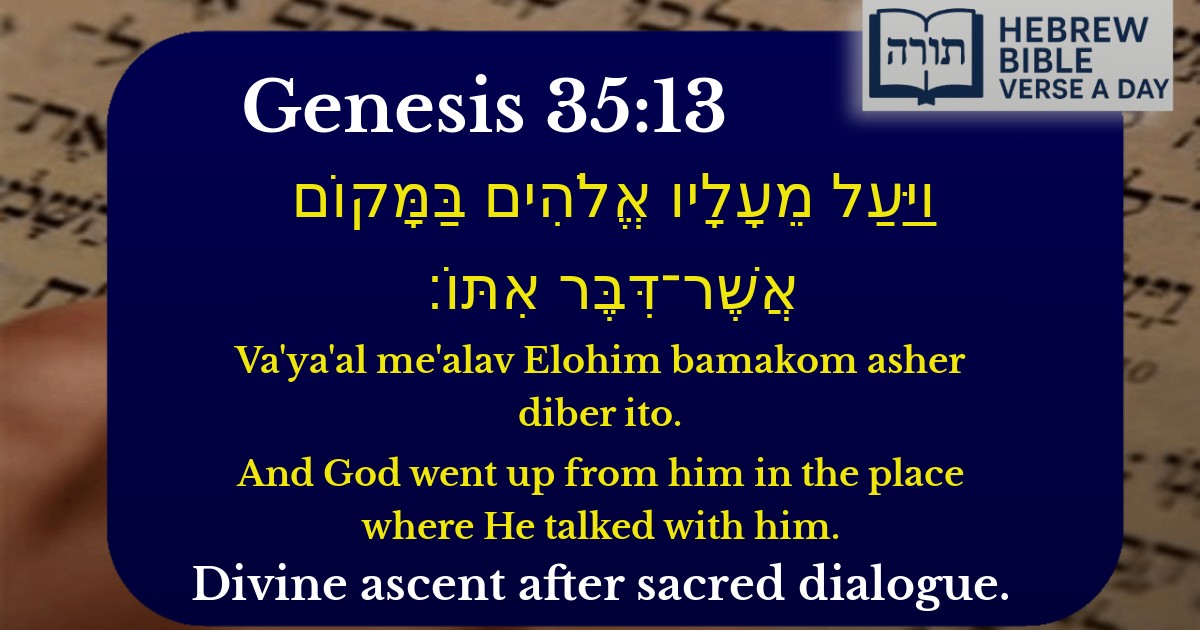Join Our Newsletter To Be Informed When New Videos Are Posted
Join the thousands of fellow Studends who rely on our videos to learn how to read the bible in Hebrew for free!
Hebrew Text
וַיַּעַל מֵעָלָיו אֱלֹהִים בַּמָּקוֹם אֲשֶׁר־דִּבֶּר אִתּוֹ׃
English Translation
And God went up from him in the place where He talked with him.
Transliteration
Va'ya'al me'alav Elohim bamakom asher diber ito.
Hebrew Leining Text
וַיַּ֥עַל מֵעָלָ֖יו אֱלֹהִ֑ים בַּמָּק֖וֹם אֲשֶׁר־דִּבֶּ֥ר אִתּֽוֹ׃
וַיַּ֥עַל מֵעָלָ֖יו אֱלֹהִ֑ים בַּמָּק֖וֹם אֲשֶׁר־דִּבֶּ֥ר אִתּֽוֹ׃
🎵 Listen to leining
Parasha Commentary
📚 Talmud Citations
This verse is not quoted in the Talmud.


Commentary on Genesis 35:13
The verse states: "וַיַּעַל מֵעָלָיו אֱלֹהִים בַּמָּקוֹם אֲשֶׁר־דִּבֶּר אִתּוֹ" ("And God went up from him in the place where He talked with him"). This follows Yaakov's encounter with Hashem at Beit-El, where he received divine blessings and reaffirmation of the covenant.
Rashi's Explanation
Rashi (Genesis 35:13) explains that the phrase "וַיַּעַל מֵעָלָיו" ("went up from him") indicates that the Divine Presence ascended gradually, as if to show reluctance in departing from Yaakov. This mirrors the way a king departs from a beloved friend—slowly, to allow for lingering closeness. Rashi connects this to the Midrash (Bereishit Rabbah 82:7), which teaches that Hashem’s presence remains with the righteous even after revelation, sustaining them.
Rambam’s Perspective
In Moreh Nevuchim (1:27), Rambam discusses prophetic visions and explains that when Scripture describes Hashem "ascending" or "descending," it refers to the prophetic experience—where divine communication ceases, and the prophet returns to ordinary consciousness. Here, Yaakov’s prophetic encounter concludes, marking the end of direct revelation.
Midrashic Insights
Kabbalistic Interpretation
The Zohar (1:153b) interprets the ascent as a return of the Shechinah to its heavenly abode, having completed its mission of blessing Yaakov. This mirrors the cyclical nature of divine interaction—descent for revelation and ascent for concealment, yet leaving an imprint of holiness.
Halachic Implication
The Ramban (Genesis 35:13) connects this verse to the concept of ma’amad Har Sinai—just as Hashem’s presence departed from Sinai after Matan Torah, yet the sanctity remained, so too at Beit-El. This teaches that places of divine encounter retain holiness for future generations.